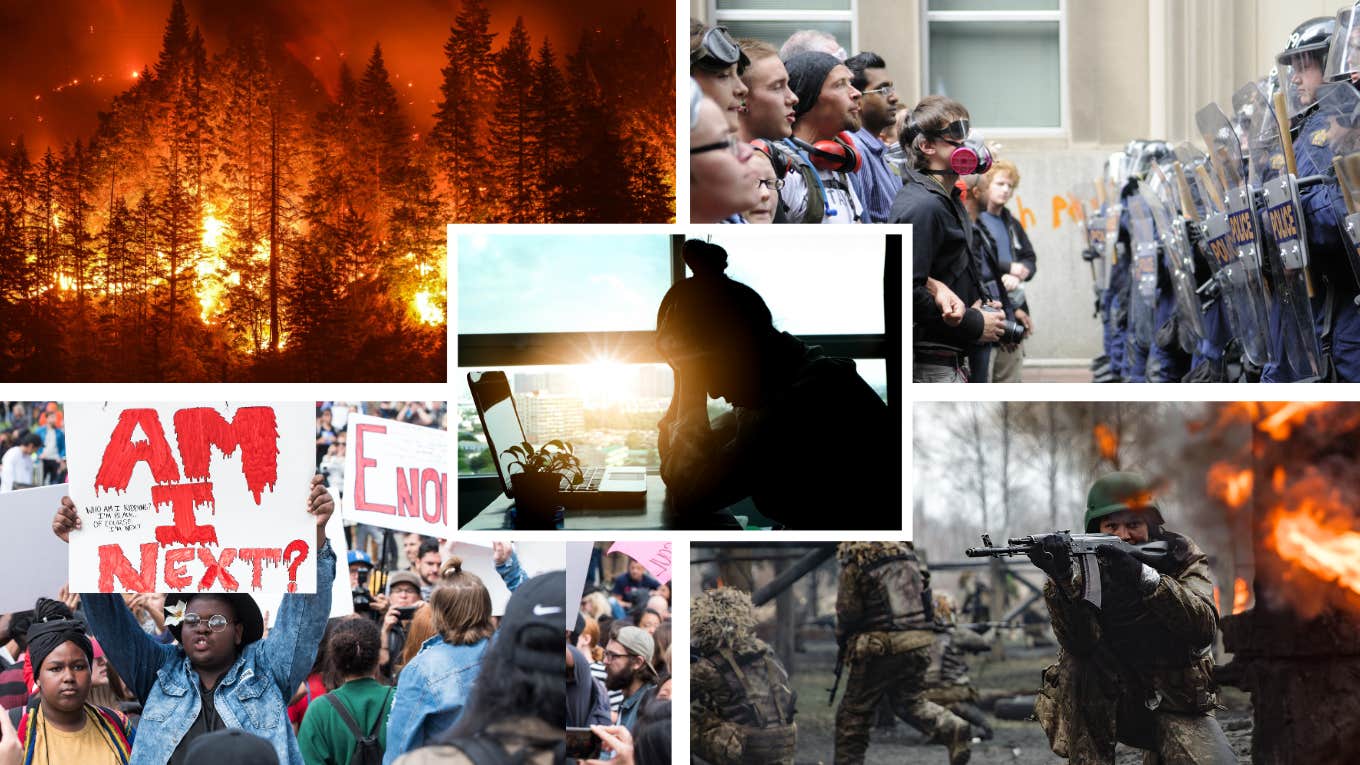HR Professional Calls Out How 'Dystopian' It Feels To Have To Do Our Jobs Amidst Tragedy — 'We Need Some Kind Of Catastrophe Leave'
Every day the world seems to fall more spectacularly apart... and we all have to just go to work and pretend it's not happening.
 Christian Roberts-Olsen, arindambanerjee, Dmytro Larin, Hayk_Shalunts, Me dia / Shutterstock
Christian Roberts-Olsen, arindambanerjee, Dmytro Larin, Hayk_Shalunts, Me dia / Shutterstock Our country and the world have been through hard times before, but there's something distinct about the past few years that feels increasinly abnormal. Even many elderly people, who've lived through the turbulence of World War II or the Civil Rights movement, feel it — everything seems to have gone off the rails.
And we're all expected to just maintain the status quo through all of it. Going about our lives like normal. Logging onto work each day like nothing's happening, like it's just another day.
Amid the ghastly conflict that has erupted in the Middle East, the stomach-churning incongruity of just continuing to work through the horror feels even more pronounced. How are we supposed to continue doing this?
An HR professional thinks it's time for employers to take into account how 'dystopian' it feels to have to do our jobs amidst tragedy.
Morgan Sanner, an HR professional and resume writer known as @resumeofficial on TikTok, recently shared her thoughts on this bizarre and discomfiting phenomenon that we've all been wrestling with for what seems like decades now.
But then, it has been in a way, hasn't it? The entirety of the 21st century has been one calamity after another. From 9/11 to the 2008 global financial crisis to the 2016 election and January 6, and all the innumerable climate disaster and mass shootings and political fights in between, it has been this way for so long — and we've all just been clocking in for our shifts and showing up for our morning meetings like normal.
"It feels so dystopian to look at the news and see all the awful things happen in the world and then open your computer and continue working like nothing has happened," Sanner said in her video.
Sanner thinks employers need to start recognizing how damaging this is to employees and make space for them to deal with it.
"I think organizations need to start using some kind of catastrophe leave or something," she said, "because this is not normal to see something so horrific and then be expected to lead a meeting about marketing. Nobody cares about marketing right now."
She's certainly not alone in that sentiment. Social media is full of rueful jokes about this phenomenon, which just serves to underline how universal a feeling it is.
It feels so sickeningly incongruous because, in the end it is. We are human beings, not cogs in a machine, no matter how much our capitalist economy wants us to think otherwise.
It is, in fact, against our very wiring to simply turn away from atrocities and work on a spreadsheet. It feels untenable because it should be untenable. And it really might be time employers start taking that into account.
It is clinically proven that witnessing events secondarily online or in the news is traumatizing.
It's not just your imagination, and it's not because we've all "gone soft" in recent years. Studies have repeatedly shown that exposure to the horrors that regularly blanket not just our news programming but our social media feeds is actually traumatizing us.
Scientists and mental health professionals call this "vicarious traumatization," and it means our brains quite literally cannot really differentiate between a violent image we see on a screen and one we witness firsthand. Worse still, a 2013 study found that in some cases it is actually more traumatizing to witness a traumatic event secondhand than it is to actually experience it yourself in real time.
The study focused on those who'd witnessed the 2013 Boston Marathon bombing in-person or who lived nearby, and those who'd only watched it on the news. It found that those who watched at least six hours of news coverage of the bombing were actually more acutely stressed than those who were there in-person.
And that's not all — the constant repetition of these images, whether from re-viewing them online or on the news, or from similar events occurring subsequently, means our brains cannot ever actually heal from them and find closure. We just carry around the trauma, day after day, piling them on top of each other.
Notice that none of this research focuses on children, the only group of people we ever seem to talk about with any seriousness when it comes to the impacts of social media. But it is barraging and damaging us all, even those of us fully grown and supposedly above such dangerous susceptibility. Protect your children, yes. But you must also protect yourself.
So, no, it quite literally isn't normal to have to do our jobs amidst tragedy, and it's damaging our brains and mental health. It's time that we, our workplaces, and our bosses start recognizing this and making space for it. Because the way the world is cracking apart, it certainly isn't going to get better any time soon.
Sometimes, work has to wait. We are human beings, not spreadsheets.
John Sundholm is a news and entertainment writer who covers pop culture, social justice and human interest topics.

